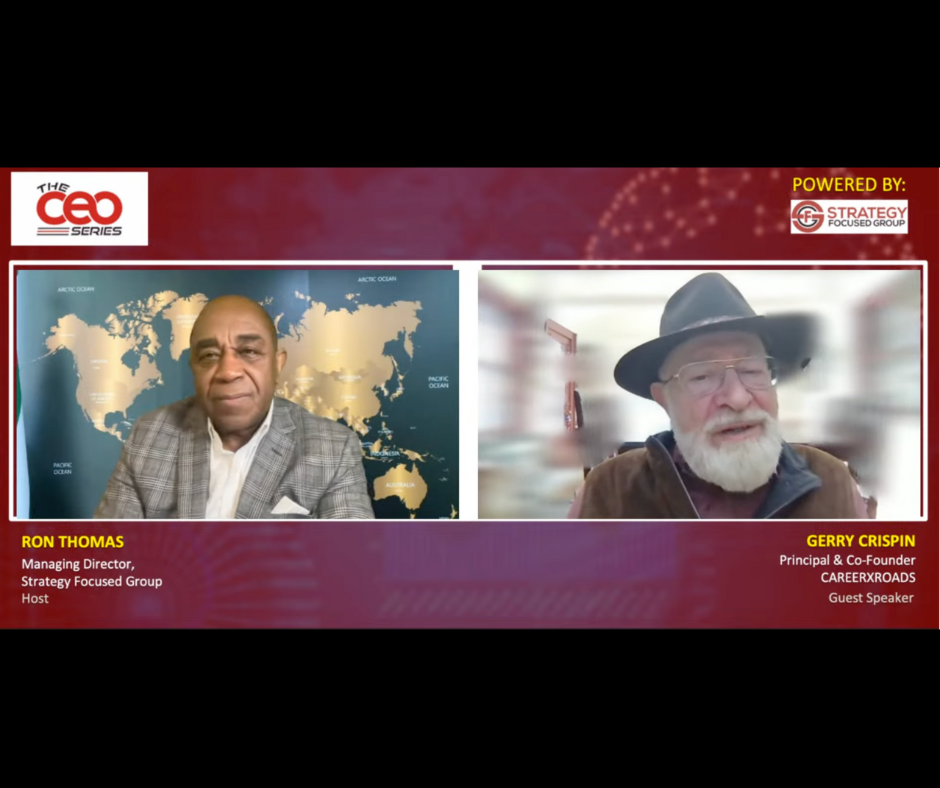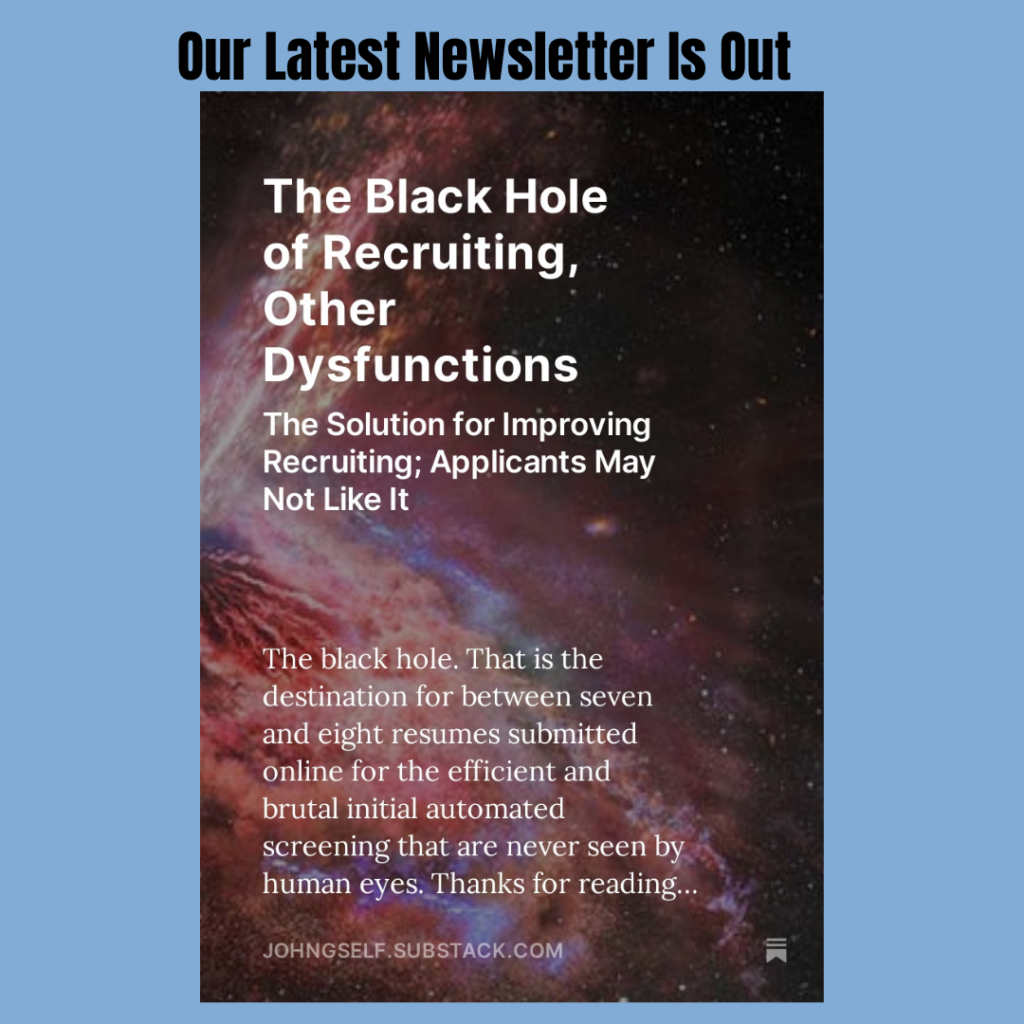JOB SEEKERS: Beware of this Peter Principle
The Peter Principle, where individuals are promoted to their level of incompetence, is alive and well in America. In corporate America, to be precise. In the executive suite, to put a fine point on it.
The failure rate of new executives is shockingly high. This is not a new post-pandemic trend. It has been a costly fact of life for 30 years since the Corporate Executive Board (CEB) first began to track this phenomenon in 1994.
To read more, click this link.
https://johngself.substack.com

Link for the full interview: https://www.youtube.com/watch?v=-yDM3dIHHsI&t=2304s.
WHich College Degree Will You Bet On: TECHNOLOGY OR LIBERAL ARTS?
In five to ten years, which degrees will be more valuable—technology or liberal arts? Through today’s lens, most people would say technology. They would be wrong.
So says legendary investor and entrepreneur billionaire Mark Cuban. The most critical degrees will be in liberal arts. When you have sophisticated automation of automation, Cuban believes, you will need people with a different perspective to maximize the effective use of the information.
Mr. Cuban is no futurist. He is a savvy businessman with a keen eye for reading the nature and pace of change, and he is very likely spot-on on this subject.
Game-changing advances in machine learning, neural networks, and deep learning are fueling the rise in the automation of automation. Once this technological phenomenon reaches a tipping point, our long-held ideas regarding workforce management and economic development will go out the window.
Unless you have the sophisticated skills necessary to design and maintain these highly complex network structures that are already emerging at breathtaking speed, thousands of entry-level and traditional programmers and software engineers who have produced the operating systems and the “app magic” that are already rapidly changing our lives, will be out of a job. As long as you have the knowledge, insight, and skills such that the computer works for you, you will be fine, but as soon as that construct flips and you work for the computer, you will be out of a job, Cuban believes.
The technology and pace of change that used to take 50 years, then 30, then 10, could now take five, three, or fewer years. Cuban predicts that the nature of employment will change.
Mr. Cuban believes the key issue is not if or when this tipping point will occur but what we will do with all the people who find that their expertise and skills have been machine-automated and no longer have a job. “Most large companies already see this. They know they will not need as many employees as they have today,” Cuban explained.
This disruption will spread across the entire economy, producing massive unemployment. Traditional solutions, such as education and job training for adults, will not work.
He returns to the big question: “What will you do with the 5 or 10 million people without jobs?”
I think there is a larger question: How do we manage this epic crisis with a dysfunctional government operating with a record deficit (which is treated more as a campaign issue rather than an existential national security threat — the interest on this debt exceeds the current Pentagon budget), an unstable geopolitical order, and, sooner or later, massive economic disruption caused by millions of college-educated and skilled employees falling into unemployment.
Aging Executive Succeeds BECAUSE, Not IN SPITE OF His Age
While the most valuable tech companies were founded in dorm rooms, garages, and diners by notably young entrepreneurs—19 to 30 years old—the world’s most invaluable company was founded by Morris Chang when he was 55 years old.
As the Wall Street Journal reported, this is the first time anyone so old created a company worth so much. Mr. Chang created Taiwan Semiconductor Manufacturing — known to business insiders who know the story as TSMC — and was successful not despite his age but because of his age.
Mr. Chang had a long and successful career in the chip industry. He would have been judged to be a huge success if he had retired in 1985 after 30 years of success in the US and played bridge (a passion) for the rest of his life. Instead, he reinvented himself, moved to Taiwan, and created a stand-alone chip manufacturer that produced essential parts for computers, phones, cars, artificial intelligence, and many other devices integral to our daily lives.
His approach revolutionized the industry. He manufactures chips that he neither designs nor markets. He has created a business model that prevents him from competing with his clients. In return, those potential competitors were saved from developing, constructing, and operating costly, complex, and sophisticated facilities where circuits are carved on silicon wafers.
Not only did Chang revolutionize the chip-making business, but he built a company that has become indispensable to the global economy.
Without his industry knowledge, years of experience, and manufacturing insights, he would not have envisioned such a plan.
For older workers struggling to get “back in the game” with a productive, rewarding job, take note of Mr. Chang, take to heart his success, and believe that your story can also be compelling.
Bad Recruiting, Poor Accountability Costs Businesses Millions

Here is a link to our latest newsletter on Substack. This week, we take a sharp look at recruiting and the fact this industry, including corporate recruiters, is long on process and short on innovation and accountability. https://open.substack.com/pub/johngself/p/bad-recruiting-poor-accountability?r=1yx2a6&utm_campaign=post&utm_medium=web
Subscribe before May 6 to claim a free subscription. Visit the newsletter for signup information.
Active Career Management Is Not Only Necessary, It Is Essential For Your Future Success
Something big has happened in the world of career management, and most people either do not see it or don’t think it will impact them.
My response: First, you need to pay attention.
My second point: Yes, it will affect you in ways that could impact your livelihood.
My third, and most important point: You ignore these changes at your peril.
Let’s take a look at this big change.
There are fewer executive and management positions. The competition is intense.
There are fewer executive and management positions. The competition is intense.
JohnGSelf.Com
The time-to-hire, which for years had floated anywhere from four to six months, has expanded now from eight to fourteen months or more.

Increasingly many of the best jobs are not listed. They are filled based on a referral from a trusted source. When they are posted online, applicants must navigate cumbersome and inconsistent automated hiring processes, including Applicant Tracking Systems, which evaluate incoming resumes and make initial decisions regarding qualification and suitability. On average, seven out of 10 resumes submitted online, are eliminated before ever being seen by human eyes. The odds for success with an online application, currently range from 150 and 2o0 to one.
Passive applicants, those people who might be interested in a job if they were aware of its existence, were usually a smaller percentage of candidates for any management or executive job. Now, with high-speed applicant sourcing scanners sweeping through LinkedIn profiles, corporate recruiters can find hundreds of potential passive applicants in a matter of minutes.
Unlike their brethren from the white shoe executive recruiting firms, corporate recruiters historically never called potential passive applicants who worked for competitors. They didn’t have time. Besides making those types of sourcing “cold calls” to steal talent felt somehow unethical and at best uncomfortable. Their strength in applicant sourcing was grounded in that highly sophisticated, time-tested process called “post and pray.”
In my earlier life, as a search firm recruiter, I once had a healthcare Human Resource Vice President add to a long and unrealistic list of selection criteria that they did not want me to steal talent from other hospitals. I got that provision eliminated from the ‘’rules” I had to follow in a private, jaw-dropping meeting with the HR executive’s boss, the CEO.
With these automated applicant sourcing scanners, combined with the increasingly obvious fact that more managers and executives are looking for work than there are available jobs, you should realize the competition for the “listed” jobs just got more intense, dramatically worsening your odds for success with online applications which is exactly how the majority of managers and executives attempt to find a job.

When you pull these factors into focus, the level of delusion in the ranks of management and executive job seekers is astounding. This finding is based on dozens of interviews I have conducted with managers and executives over the past two years. It is as if an executive touches a hot pipe even after being warned not to. As the executive nurses the palm of his burned hand, he explains why he ignored the pipefitter’s expletive-laced warning: that this particular pipe hasn’t been hot for years.
The old days and the old ways of finding a management or leadership job, extending back more than 75 years, are over. Active Career Management (ACM)is now, and forever more, will be essential to achieving sustainable professional success.
Career Boot Camp Planned for April
ACM will be one of the focal points of the YourCAREER Community boot camp scheduled for April. This three-hour event will cover the essential elements of career management, from building a Value Brand Statement and an ATS-friendly resume to Networking 3.0, mastering the art of the job interview, managing a job search, planning a career change, and overseas employment.
This three-hour event, produced by JohnGSelf.Com, is being planned for a Saturday morning. Admission will be free.
Watch for the save-the-date announcement on Thursday along with additional details regarding the complete agenda as well as some great guest speakers.
Excitement Brews Over AI-Driven Cost Cuts
Saudi Wealth Fund leaders returned to Miami Beach last week for their Future Investments Initiative gathering.
Well-heeled investors, including the ex-president’s son-in-law and several cabinet secretaries, were in attendance. Also there were Michael Dell, the former SoftBank executive Marcelo Claure, the private equity mogul Robert Smith, and Gwyneth Paltrow (who is raising a venture fund.)
On the subject of AI, Andrew Ross Sorkin, who produces the New York Times’ DealBook column, reported that “Artificial intelligence was a major topic on and offstage. One executive told DealBook that people weren’t fully appreciating how many layoffs the technology will bring. Another recounted conversations in which other corporate leaders spoke excitedly about A.I.-driven cost cuts, Sorkin wrote”
This reporting from DealBook notwithstanding, the number of jobs that will be lost to AI remains uncertain, like so many other things in today’s economy, including whether we will, or will not have a recession.
I have found that CEOs who run public companies periodically like to talk about reducing headcounts or the potential for plans for layoffs in the future because it is music to Wall Street’s ears and bumps up the share price.
Many Americans Believe the Economy Is Rigged
Writing in a guest essay for the New York Times, Katherine J. Cramer and Jonathan D. Cohen report that many Americans they have interviewed believe the economy was created by the rich and powerful “to benefit themselves and have left others with too little or nothing at all.” (If you are not a Times subscriber, you may encounter a paywall notification)
Ms. Cramer is a co-chair of the Commission on Reimagining Our Economy at the American Academy of Arts & Sciences. Mr. Cohen is a senior program officer at the American Academy of Arts & Sciences.
“When experts talk about the economy, they often focus on issues that many Americans feel have little effect on their lives. Growth and productivity are important, but they are not everything. The nation needs to focus less on how the economy is doing and focus more on how Americans are doing,” Ms. Cramer and Mr. Cohen wrote.
I believe that is a big reason that President Biden’s polling numbers on the economy are troublesome for his re-election. In a recent Gallup poll, 45 percent of Americans rate the economy as poor; 63 percent say it is getting worse, not better. When asked how they were doing economically, 63 percent said high prices pose a severe or moderate financial hardship, according to Gallup’s January poll.
If AI automation does drive the elimination of thousands of US jobs, this belief that the economy is rigged will only be reinforced. It will be a heavy lift for politicians or anyone else to explain to hard-working Americans that this mysterious magic that has upended their lives is not inherently bad.
The Black Hole of Recruiting, Other Dysfunctions
Check out our latest newsletter on Substack.

